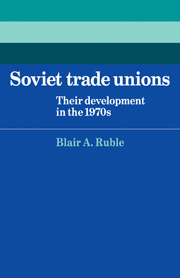Book contents
- Frontmatter
- Contents
- List of tables and figures
- Acknowledgments
- Abbreviations
- Introduction
- 1 Soviet trade union development: 1917–1956
- 2 Soviet trade union development: 1957–1980
- 3 Union–management–Party relations at the plant
- 4 The legal and social rights of Soviet workers
- 5 Do workers participate in Soviet management?
- 6 Patterns of union behavior
- 7 The international activities of Soviet trade unions
- Conclusion
- Notes
- Classified bibliography
- Index
5 - Do workers participate in Soviet management?
Published online by Cambridge University Press: 07 October 2011
- Frontmatter
- Contents
- List of tables and figures
- Acknowledgments
- Abbreviations
- Introduction
- 1 Soviet trade union development: 1917–1956
- 2 Soviet trade union development: 1957–1980
- 3 Union–management–Party relations at the plant
- 4 The legal and social rights of Soviet workers
- 5 Do workers participate in Soviet management?
- 6 Patterns of union behavior
- 7 The international activities of Soviet trade unions
- Conclusion
- Notes
- Classified bibliography
- Index
Summary
From the earliest days of their revolution Soviet labor leaders have portrayed their union organization as a legitimate framework for worker participation in management. This image has come to legitimize much of what Soviet trade unions say and do. Appearing before the Sixteenth Trade Union Congress in 1977, Communist Party General Secretary L. I. Brezhnev noted that the unions' primary duty must be to involve workers directly in economic, political, and social administration. A little more than a year later, AUCCTU Chairman Shibaev praised the 121 million–member Soviet trade union organization as a powerful link between citizen and state, worker and management.
A preeminent Soviet labor law specialist, the late N. G. Aleksandrov, once made the case for worker participation in Soviet management by describing a series of union endeavors: production conferences, joint union–management decision-making forums, socialist competition, union review of managerial innovation decisions, and union participation in national economic decision making. Yet, these mechanisms – along with such already discussed union activities as dispute commissions, safety inspectors, and social insurance delegates – represent only indirect consultation at best.
Numerous structural constraints inhibit official familiarity with worker viewpoints. Union nomenklatura careers advance through selection from above. Quite naturally, many officials become less aware of rank-and-file demands than they are of their superiors' orders. The multifaceted nature of union obligations further aggravates this problem. The deputy union chairman of Moscow Watch Factory No. 2, I.
- Type
- Chapter
- Information
- Soviet Trade UnionsTheir Development in the 1970s, pp. 90 - 103Publisher: Cambridge University PressPrint publication year: 1981

